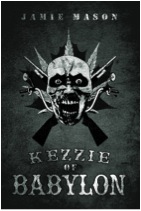In my backyard, I have a tree whose fruit is colored bottles, and it serves a useful purpose. The bottles trap and kill evil spirits. During the night, evil spirits wander into the bottles, and they can’t find their way out””basically like a lobster trap for spirits. Then, when the morning sunlight hits the bottles, the evil spirits, which don’t like sunlight, are burned away. Poof!
Skeptical? Where’s your sense of mystery? The bottle tree legend is believed to have originated in Africa and been brought to the states with African slaves, which is why you’re more likely to see one in the South. Being a transplanted Yankee, I’d never seen a bottle tree until I experienced one years ago at The Antique Rose Emporium in Brenham, Texas. It was a thing of beauty, and a sign nearby explained the legend. I thought the idea was so cool that I wanted to have one, but I needed the right structure. Some people use welded metal rods, but I wanted something more organic. So, when our Majestic Indian Hawthorn tree died last year, I saw an opportunity to have a bottle tree although I knew it would take some work.
 With its dry, rust-colored leaves and green lichen, the tree still had a unique beauty, but it wouldn’t have lasted. Something needed to be done. I could have cut it down and planted something else, but the surrounding live oak trees had caused this area of the yard to become too shady for most trees to grow. I think the shade is what killed this one. But every morning, sunlight climbs over our fence, around a large magnolia, and underneath the branches of the live oak, and it illuminates the dead tree for at least an hour. The morning sunlight may have been what spawned my idea of turning it into a bottle tree. I saw an opportunity to take a dead thing and turn it into””I hoped””an attractive lawn ornament. And maybe, I thought, I might even eliminate some evil spirits wandering around the neighborhood””at which point, my left brain started screaming at me, “Are you #$%&ing kidding me? Evil spirits? What is this? Pre-enlightenment?” To which, my right brain answered, “Really? Every culture has stories of good and evil spirits, so how do you know that they don’t exist?” I imagine my left hand went up to rub and soothe my left temple.
With its dry, rust-colored leaves and green lichen, the tree still had a unique beauty, but it wouldn’t have lasted. Something needed to be done. I could have cut it down and planted something else, but the surrounding live oak trees had caused this area of the yard to become too shady for most trees to grow. I think the shade is what killed this one. But every morning, sunlight climbs over our fence, around a large magnolia, and underneath the branches of the live oak, and it illuminates the dead tree for at least an hour. The morning sunlight may have been what spawned my idea of turning it into a bottle tree. I saw an opportunity to take a dead thing and turn it into””I hoped””an attractive lawn ornament. And maybe, I thought, I might even eliminate some evil spirits wandering around the neighborhood””at which point, my left brain started screaming at me, “Are you #$%&ing kidding me? Evil spirits? What is this? Pre-enlightenment?” To which, my right brain answered, “Really? Every culture has stories of good and evil spirits, so how do you know that they don’t exist?” I imagine my left hand went up to rub and soothe my left temple.
Seriously, as a scientist turned fiction writer and visual artist, my left brain and right brain war with each other constantly. My left brain would like to think that we live in a world where physical phenomena can be explained, and we humans are in control of our destiny. And then my right brain feels trapped and constrained. It asks why we have crowded out life’s mysteries with data and facts, and it points to the many, many things we don’t know and can’t explain. It liked a book I read recently called We Have No Idea: A Guide to the Unknown Universe, by Jorge Cham and Daniel Whiteson, which is about the physics of the universe and what we can’t explain. My right brain is also currently having fun reading a couple of fantasy books: D. L. Jenning’s Gift of the Shaper, and Cat Rambo’s Hearts of Tabat. Both of these books have taken me to places and given me adventures that I wouldn’t have imagined. My right brain also points to the classics in metaphysics, told through mythos, because this is the language that explains our major religions, which all wrestle with the clouds of unknowing and mysteries larger than ourselves. I have come to realize that this war in my brain is why I like to write and read science fiction. I get to use both sides””when they cooperate with each other. Good sci-fi and fantasy books build worlds believable within the texts, yet either delve into or create their own mysteries, things not known or understood. Yet this exploration of and embracing of mystery is not for everyone.
 I recently wrote a blog post about reading the literary great Flannery O’Connor’s book Mystery and Manners: Occasional Prose. In it, she discusses her thoughts on writing fiction, and one of her themes is the role of mystery in fiction. She says, “It is the business of fiction to embody mystery “¦ and mystery is a great embarrassment to the modern mind” (p. 124). It can be an embarrassment because we humans labor under the delusion that we can know all things if we can just construct a predictive model and work out the mathematics. This premise has worked well for us in the past and brought us pharmaceuticals, electronics, spaceships, and smart phones. But, in the absence of a grand unified theory of matter after decades of trying, some scientists are beginning to wonder if mathematics has its limits. Are there things it can’t do? The answer to this question brings me back to the evil spirits that I’ve been trapping in my colored bottles.
I recently wrote a blog post about reading the literary great Flannery O’Connor’s book Mystery and Manners: Occasional Prose. In it, she discusses her thoughts on writing fiction, and one of her themes is the role of mystery in fiction. She says, “It is the business of fiction to embody mystery “¦ and mystery is a great embarrassment to the modern mind” (p. 124). It can be an embarrassment because we humans labor under the delusion that we can know all things if we can just construct a predictive model and work out the mathematics. This premise has worked well for us in the past and brought us pharmaceuticals, electronics, spaceships, and smart phones. But, in the absence of a grand unified theory of matter after decades of trying, some scientists are beginning to wonder if mathematics has its limits. Are there things it can’t do? The answer to this question brings me back to the evil spirits that I’ve been trapping in my colored bottles.
I don’t expect an evidence that I’m reducing the evil spirits in our neighborhood. If I could show evidence, I’d lobby to install several in Washington D.C. But then, the tree would have to be the size of the Rockefeller Plaza Christmas tree in order to accommodate the five-gallon jugs required to haul in the spirits that cause discord, the unwillingness to compromise, and lack of empathy. The last spirit is particularly polarizing and, coincidentally, something that good fiction can address.
Recent Trends in Cognitive Science published a study a couple of years ago showing that people who read character-driven fiction are more empathetic. Reading and understanding stories helps people imagine other worlds and other consciences. And these other-person experiences are part of the mystery of good fiction, and in particular good science fiction and fantasy. Experiences and the meaning of those experiences are different for everyone who reads a story or novel. We all as readers ascribe our own meanings to a text.
 This experienced meaning is, I think, the reason why I’ve had a hard time reducing my novel Incense Rising to a movie-trailer synopsis. When asked what it’s about, I usually say the genre is speculative fiction or science fiction””but not like Star Wars””and the plot is around a scientist who becomes a fugitive to save a scientific theory; however, in a deeper sense, it explores the commercialization of our humanity. I felt bad about my shortcomings around writing a good elevator pitch until I read O’Connor’s view of experienced meaning in novels: “The meaning of a story has to be embodied in it, has to be made concrete in it. “¦ When anybody asks what a story is about, the only proper thing is to tell him to read the story. The meaning of fiction is not abstract meaning but experienced meaning, “¦” (Mystery and Manners, p. 96). Yes! The mystery of fiction is in the experienced meaning, the many experienced meanings. We authors take readers on journeys, and they end up somewhere different from where they started. I’ve come to understand something of this mystery of fiction and why we like it and why we should read more of it, but I never expected that creating a bottle tree would relate to any of these insights on why I write.
This experienced meaning is, I think, the reason why I’ve had a hard time reducing my novel Incense Rising to a movie-trailer synopsis. When asked what it’s about, I usually say the genre is speculative fiction or science fiction””but not like Star Wars””and the plot is around a scientist who becomes a fugitive to save a scientific theory; however, in a deeper sense, it explores the commercialization of our humanity. I felt bad about my shortcomings around writing a good elevator pitch until I read O’Connor’s view of experienced meaning in novels: “The meaning of a story has to be embodied in it, has to be made concrete in it. “¦ When anybody asks what a story is about, the only proper thing is to tell him to read the story. The meaning of fiction is not abstract meaning but experienced meaning, “¦” (Mystery and Manners, p. 96). Yes! The mystery of fiction is in the experienced meaning, the many experienced meanings. We authors take readers on journeys, and they end up somewhere different from where they started. I’ve come to understand something of this mystery of fiction and why we like it and why we should read more of it, but I never expected that creating a bottle tree would relate to any of these insights on why I write.
Creating the bottle tree itself was a journey. I started sometime last November by sawing off small or weak branches, removing leaves, and scraping off the lichen. Then I began collecting different colored bottles with openings large enough to fit over the branches. I took pictures of the bottles in the sunlight, moved them around, discovered what they do collect””spider webs, an occasional bug, and condensation””and I even installed a birdhouse. And, somewhere between creating a bottle tree and reading Flannery O’Connor’s Mystery and Manners, I had an epiphany about the value of nurturing life’s mysteries, why I like to read and write science fiction, and why more people should read fiction. We all need some mystery, empathy for others, and maybe even a bottle tree.
Nancy’s most recent book is Incense Rising, a near future SF thriller set in a world where consumerism and politics have merged,
Author bio: I have been writing all my life although I began trying to publish my fiction only recently. My story ideas usually start with a “what if?” question. For example, what if we encountered alien life forms with a copper-based oxygen transport instead of hemoglobin? The result: “The Silver Strands of Alpha Crucis-d,” published by The Magazine of Fantasy & Science Fiction, Mar/Apr 2016.
I may have taken a convoluted path to arriving at writing speculative fiction, but now that I have, I can’t believe I didn’t do this sooner because I’m having so much fun!
Asking “what if” questions is an important part of engaging in scientific research, which is what I did for many years. After earning a Ph.D. in organic chemistry from the University of Illinois, I went to work for a large chemical company and spent twenty-five years engaged in research. In 2012, I earned a master’s degree in English from the University of West Florida (UWF), and I’ve been writing fiction, creative nonfiction, and poetry ever since. I teach classes in organic chemistry and writing for STEM majors as an Adjunct Instructor at UWF. When I’m not writing or teaching, I like to do artwork. I’m a member of Quayside Art Gallery in Pensacola, where I work two days a month.
Find Nancy’s website at https://njschrock.com or follow her on Twitter.
Enjoy this writing advice and want more content like it? Check out the classes Cat gives via the Rambo Academy for Wayward Writers, which offers both on-demand and live online writing classes for fantasy and science fiction writers from Cat and other authors, including Ann Leckie, Seanan McGuire, Fran Wilde and other talents! All classes include three free slots.
If you’re an author or other fantasy and science fiction creative, and want to do a guest blog post, please check out the guest blog post guidelines.













